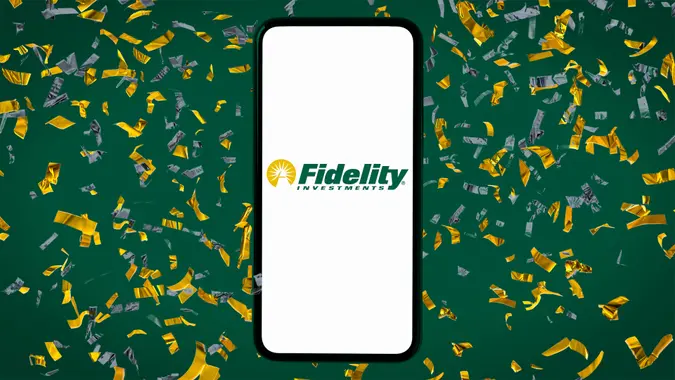Fidelity CD Rates for October 2024

Commitment to Our Readers
GOBankingRates' editorial team is committed to bringing you unbiased reviews and information. We use data-driven methodologies to evaluate financial products and services - our reviews and ratings are not influenced by advertisers. You can read more about our editorial guidelines and our products and services review methodology.

20 Years
Helping You Live Richer

Reviewed
by Experts

Trusted by
Millions of Readers
Fidelity Investments is a brokerage providing stock trading, IRAs, Roth IRAs, mutual funds, ETFs and brokered CDs, among other products. Fidelity also offers fee-free trading, 24/7 phone help and over 200 branch locations across the U.S. for personalized service.
What Are Fidelity’s CD Rates Right Now?
| Term | Annual Percentage Yield (APY) |
|---|---|
| 3 months | |
| 6 months | |
| 9 months | |
| 12 months | |
| 18 months | |
| 2 years | |
| 3 years | |
| 4 years | |
| 5 years |
How Do Fidelity CDs Work?
Fidelity’s brokered certificates of deposit are issued by a variety of banks. You can choose the banks to invest. Since you can divide CDs across multiple banks, using Fidelity as your brokerage, your money can be FDIC-insured past the maximum per-account limit of $250,000. Yet you don’t have to open multiple trading or deposit accounts, making money management easier. You can manage all your CDs through the Fidelity app.
Most new-issue Fidelity CDs are sold in $1,000 increments. If you wanted to open a $20,000 CD, you would purchase 20 $1,000 CDs. Fidelity also offers fractional CDs, sold in increments as low as $100. Interest rates for whole CDs may be higher than for fractional CDs. The rates above indicate whole CD rates.
Fidelity offers step-rate CDs, which are on a step-up coupon schedule, among its CD offerings. Step-rate CDs pay a fixed interest rate amount for a certain period and then pay a higher interest rate. This can be higher or lower than prevailing market rates through the maturity date.
Fidelity offers brokered CDs as either new issue offerings or from the secondary market.
Bank CD vs. Brokered CD
You may wonder about the differences between brokered CDs you purchase through Fidelity and bank CDs that you can buy online or at traditional brick-and-mortar banks. Brokered CDs and bank CDs share many similar characteristics, including a fixed interest rate and FDIC insurance.
However, you can sell brokered CDs on the secondary market, which means they have more liquidity, as they don’t have to be held until maturity.
Interest
It’s important to note that brokered CDs do not pay compound interest, as bank CDs often do. Interest is deposited into your Fidelity brokerage account, not back into the CD.
Interest might be paid monthly, quarterly, semiannually, annually or at maturity, depending on the CD.
Volatility
Brokered CDs also exhibit more volatility in daily rates. While bank CDs might stay set at the same APY for months at a time, Fidelity CD rates may change daily. Check your Fidelity app or reach out to a Fidelity advisor for the most accurate rates when you are ready to invest.
Variety
Fidelity also offers more types of CDs than you may find at a bank. These include:
- Whole CDs
- Fractional CDs
- CD ladders with varying maturity dates
How Fidelity CDs Compare
When shopping around for the best CD account for you, it helps to compare varying issuing banks or brokerage firms. Fidelity CD rates do fluctuate more than bank CDs, but its rates are competitive. Here is how Fidelity stacks up.
Fidelity CDs vs. Competitors
| Bank or Brokerage | 6-month CD Annual Percentage Yield (APY) | 1-year CD Annual Percentage Yield (APY) |
|---|---|---|
| Fidelity | ||
| Discover® Bank, Member FDIC | ||
| Marcus by Goldman Sachs, Member FDIC | ||
| Bank of America, Member FDIC |
About Fidelity’s Auto Roll Program
Fidelity new-issue CDs with terms of up to five years qualify for the brokerage’s Auto Roll program. When the principal is about to mature, you will receive an alert. Fidelity’s service will assist you in exploring reinvestment options similar to your initial investment.
You can turn off the service at any time during the CD’s term with no penalties. You can also add to your position, or you can opt to sell part of the position while reinvesting the balance.
Since you can choose where to invest, you have greater control over your money than you might with bank CDs. When a bank CD reaches maturity, you can withdraw the money to your checking account or savings account. This lets you shop around for a higher interest rate or roll the money over into a new CD at your bank’s prevailing rate. Fidelity CDs allow you to keep the money within the brokerage while choosing a new investment.
You can also use the Auto Roll program when you build a ladder of CDs with varying maturity terms.
Pros and Cons of Fidelity Brokered CDs
Fidelity is a reputable brokerage with fee-free trading and an intuitive app. Fidelity brokered CDs offer a number of advantages to investors, but there are a few drawbacks to understand, as well.
Pros
- FDIC insurance beyond $250,000
- Fractional CDs available with a minimum deposit of $100
- Auto Roll program helps your money grow faster
- No trading fees to purchase new-issue CDs
- May have higher rates than banks
- Ability to sell CDs before maturity
- No early withdrawal penalties
- Wide range of CD products
Cons
- $1,000 opening deposit for whole CD
- Pays simple interest, not compound interest
- Selling CDs before maturity could result in loss of interest and principal
Final Take To GO: Are Fidelity CDs Right for You?
Fidelity CD rates are competitive and are best for investors who want flexibility. Because Fidelity gives you a choice of multiple CDs to invest in, with options such as call protection, these investments are best for investors with some knowledge and experience.
Investing in brokered CDs is not a “hands-off” practice, where you choose your CD, choose your term and let your interest accumulate. Rather, active investors can leverage Fidelity’s options to maximize their money, increase their FDIC protection beyond the federal maximum per account and create CD ladders to increase the liquidity of their funds.
Interest rates rise and fall, but when you invest your money in a CD, you can get a guaranteed rate of return, which is comforting in today’s economy. No matter the brokerage firm or issuing bank, make sure you are getting an APY and term length that aligns with your financial goals.
FAQ
- Who has the highest-paying CD right now?
- The highest-paying CD accounts vary greatly by term length. Some of the highest-paying 6-month CD rates are currently offered by Merrick Bank, Bask Bank and Popular Direct.
- Who has the highest 12-month CD rate?
- Some of the highest 12-month CD rates can currently be found at Bread Savings, Popular Direct and Bask Bank.
Caitlyn Moorhead contributed to the reporting for this article.
Rates are subject to change; unless otherwise noted, rates are updated periodically. All other information on accounts is accurate as of Oct. 9, 2024.
Editorial Note: This content is not provided by any entity covered in this article. Any opinions, analyses, reviews, ratings or recommendations expressed in this article are those of the author alone and have not been reviewed, approved or otherwise endorsed by any entity named in this article.
 Written by
Written by  Edited by
Edited by 




























